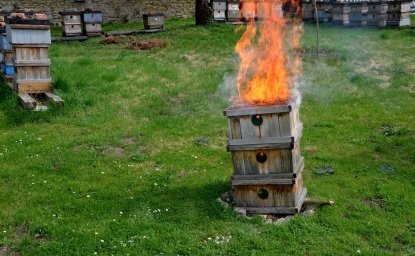Voices During the Maidan as Captured by Public Radio Ukraine

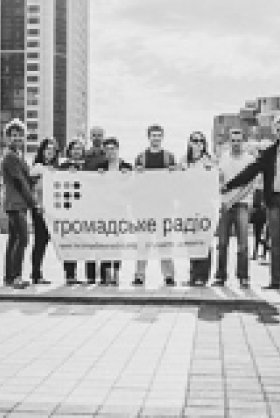
A lot has been written about the Euromaidan in Ukraine. Many have written about their memories. Oral histories are being recorded. But what were people saying, at the time, as events were unfolding?
Ihor Lutsenko had plans for a romantic dinner the evening protests erupted in Ukraine’s capital, Kyiv, on 21 November 2013. Instead, he went down to the main square, the Maidan to join those who were gathering. How do I know this? Because a Public Radio Ukraine correspondent was on the Maidan that night with a tape recorder, asking people, “Why are you here? What did you have planned for tonight?” He posted the recordings in a podcast, and I listened to it.
The journalist was Kyrylo Loukerenko. He’s one of a handful of Ukrainian journalists who decided to create an independent, self-funding radio project during the dark days of censorship in Ukraine, in the summer of 2013. They called it Hromadske Radio (Public Radio Ukraine) and began by posting podcasts on-line in August. When the November protests began, they didn’t have an office, borrowed studio time from colleagues, and were still purchasing equipment.
The first evening of what would become the EuroMaidan protests, Kyrylo recorded 14 voices. Among them were well-known people like former politician and public figure Oleh Rybachuk, and a woman who identified herself as only as Maryna. “I was at the opera,” she said. “On my way home saw people gathering with European Union flags so came to join them. I’m angry that Yanukovych turned away from the EU agreement. This is a healthy reaction.” https://soundcloud.com/hromadske-radio/21-11-13-1
Four days later, on 25 November 2013, another correspondent, Iryna Slavinska, went down to the Maidan in the middle of the day and asked the same question, "Why are you here?" But she added a spin, "Why are you here during working hours?" Earlier in the day, a Party of Regions MP had dismissed the protesters as unemployed riffraff and students who were skipping class. Iryna recorded nine voices. One was a student, 22-year-old Oksana Piddubna. When asked, “Why are you not in class?” Oksana explained, “The Ukrainian Catholic University excused us from class; it supports students in their struggle.” https://soundcloud.com/hromadske-radio/25-11-13
Over the course of the three-month protests, Public Radio Ukraine correspondents recorded the voices of hundreds of people, mainly in Kyiv, but also in other cities like Zaporizhzhia and Kharkiv — voices of people on the EuroMaidan, people on the alternative or anti-Maidan who were supporting then-president Victor Yanukovych, as well as people who were not participating in the protests.
In the early morning hours of 30 November, Andriy Kulykov wandered through the Maidan. There were only a few hundred protesters there at the time. The day before it became known that Yanukovych did not sign the European Association Agreement at the Vilnius Summit. The public radio correspondent asked those remaining in the square, “Maidan is coming to an end. What next?” All five people who spoke to him had similar things to say. Yury Butusov, editor of website Censor.Net said, “Maidan is not ending. People gathered here for an idea, the idea will continue wherever those people are.” Inna Borzylo told him, “We gathered the 100,000 signatures needed for the petition to start criminal proceedings against Yanukovych and deprive him of visas to the US.” Dmytro Krykun referred to previous protests, “The Maidan continues, just as the 2004 Maidan continues in our hearts as a cultural phenomenon, a means of communication.” Journalist Mustafa Nayyem, whose Facebook post was one of the reasons so many people had originally showed up, was also forward-looking. “The Maidan is ending? I don’t think so. Regardless how this action (protest) ends, it will have more of an impact than anything that has happened over the past three years. Because, possibly for the first time, Ukrainians took to the streets not against something, but for something.” Perhaps the most prophetic were the words of journalist Victoria Sumar. She said, “I think it [the Maidan] has just begun." https://soundcloud.com/hromadske-radio/30-11-13-2
Within a few hours, Berkut riot police descended on the Maidan and violently disbursed the protesters. Those who could, ran up the hill and took shelter behind the walls of the Mykhailivs’kyi Monastery. In the morning, Kulykov was there again with his recorder, asking the question, “What next?” Ihor Lutsenko, who’d missed his romantic dinner, was once again on site. “First of all we need to assist those in need, some need medical attention, some need food, shelter,” he said. “Secondly, we need to learn what happened. I think it was the Berkut. We need to make a statement protesting these beatings. We suspected that something might happen but we didn’t expect it to be so extremely violent,” he said. Another Ihor, who did not give his last name, was very candid, “What next? That’s just what we’re standing here and thinking about. It needs to be a simple answer but after some complex thought. I don’t have an answer for you right now.” Whereas Stanislav was clear, “After the events of last night, I plan to continue coming out. We will not be intimidated by the violence used against us, against our women. We need to keep coming out, and if there’s a critical mass, we’ll be able to [win]. Because if not us, then who?” https://soundcloud.com/hromadske-radio/30-11-13
Two weeks later, on 15 December 2013, Kulykov visited the other protest site at Mariins’kyi Park that some called the anti-Maidan. He called it the alternative Maidan, and managed to get 10 people to speak to him. Including Luhans’k mayor Serhiy Kravchenko, who said, “More than a thousand of us came here. We made an announcement and anyone who wanted to could come on the weekend, not on work days, this is not a beach… People left their families to express their views, to show that there is another view of Ukraine. We are also Ukrainians. We love our country. We want to be understood… We want European standards, European pensions, but we want to know at what cost this will be for Luhans’k… I’ll tell you honestly, for Luhans’k this will be a problem, we’ll lose 30,000 jobs immediately… It happens that our industrial production is geared towards Russia, that’s just the way it is [tak poluchylos’]… What we want from the EU is not just promises of an association agreement, but investments, technology, so that we can ‘get up on our feet.’ So that we understand that we can live without Russia.” https://soundcloud.com/hromadske-radio/15-12-13a
After clashes on Hrushev’skyi Street, on January 22th 2014, Ilona Dovhan was on the Maidan. She saw a volunteer, took out her microphone and asked, “Why are you here?” The young woman identified herself as Nataliya, a Kyiv housewife, and said. “I just came down to volunteer. At first I helped in the kitchen, now I’m helping at the first aid station… How can I stay home and peacefully watch television when this is happening?” https://soundcloud.com/hromadske-radio/maydan_voice_22-01-2014. When news began to spread that police were trying to kidnap injured activists from hospitals, Nataliya Sokolenko went to a hospital on the 23rd of January 2014 with her microphone. MP Oleksander Bryhinets was there. “We came here when we learned that Berkut is taking people out of this place,” he told her. https://soundcloud.com/hromadske-radio/gfr5iq5kaxqw
A few days later, on 26 January 2014, Anastasiya Kosodiy went out to the main square in Zaporizhzhia where people were gathering. “There’s about a thousand people here, maybe more. For Zaporizhzhia, this is huge,” she said into the microphone before asking those gathered, “Why are you here?” 25-year-old Olexiy spoke Ukrainian when he answered, “To express my protest against the violence used by ‘pravoporushni orhany’ [he was referring to the police who are called pravozakystni orhany, and did a word play saying rather than protecting rights they were violating rights]". Valeria was slightly reluctant to give her name and age, but confidently answered the question, “Because I support the Maidan; I support the people of Ukraine who rose up against this bandit-like government [vlada]… I don’t want this president. He’s a zek [ex-con]… He pushed through these laws of 16 January, we cannot abide by them, they need to be cancelled.” https://soundcloud.com/anastasia-kosodiy/5aol9lvma8ip
As violence escalated in early February, Maksym Butkevych interviewed Luidmyla Zanevs’ka, the chief physician at Kyiv’s main blood bank on the 11th of the month. “Does Kyiv have adequate blood supplies at the moment, and has anything changed over the past month?” he asked. “Let’s just say the need for blood has not changed,” Dr. Zanev’ska answered. “We have more or less enough for today. But it would be good if we had enough of a reserve that we didn’t worry about it.” https://soundcloud.com/hromadske-radio/11-02-2014
The last day Victor Yanukovych was in power, on 21 February 2014, he proposed a number of political concessions. Oleh Shynkarenko went down to the Maidan to record what people thought. The first person he bumped into was poet Oleh Lysheha. “We can’t believe a word he says,” the poet said, then added, “Immediate capitulation for Yanukovych.” An elderly woman who did not give her name said, “He is outside the law… All he had to do is press one button and he could have stopped the killing. Even if he didn’t give the order, he could have stopped it.” As a young woman was saying, “Minimum – resignation, maximum – prison,” a male voice cut in and said, "prison’s too good for him.” Many of the other comments expressed more violent suggestions of what should be done with Yanukovych. This was the day after almost one hundred protesters had been killed. https://soundcloud.com/hromadske-radio/21-2014
That same day, Andriy Kulykov went back to Mariins’kyi Park, where the ‘anti-Maidan’ had been camping. He reported into his microphone, “The fence is here, the tents are here, the bio-toilets are here, bits of brick, but it seems that the anti-Maidan people [anti-Maidanivtsi] are not here. I see people in orange vests, Kyiv municipal workers.” He walked up to one of them and asked, “Where is everybody?” “I don’t know,” a woman answered, and reluctantly said her name was Raisa. “We came to clean, and there was nobody here… These are our parks. It’s horrible [uzhas] what was done to the parks.” When Kulykov asked, “How much work do you have here today?” she said, “There’s so much work, I don’t know how long it will take.” https://soundcloud.com/hromadske-radio/21-02-2014-2
These journalists created an invaluable archive that captured the voices, words, and feelings of Ukrainians they randomly saw, who changed the course of their country's history during the winter of 2013-2014. It’s not methodologically academic, but rather in the genre of journalistic vox pop. I’ve listened to most of them, and compiled a list, although I’m not sure it’s comprehensive since SoundCloud is hard to search. When things calm down a bit in Ukraine, I hope to do a more in-depth analysis of these voices.
Marta Dyczok, DPhil (Oxon), University of Western Ontario, Wilson Kennan Fellow 2005-2006, mdyczok@uwo.ca
---
By way of a short epilogue: Ihor Lutsenko, the activist who was on the Maidan that first night and missed his romantic dinner continued to come out to protest, helped other activists. While helping the injured Yury Verbyts’kyi, he was kidnapped from the Zhovtnevyi hospital, beaten, and left to die in a snowy field, along with his friend. He regained consciousness, managed to crawl to a village, and survived. Verbyts’kyi was not so lucky, and became one of the first victims of the Maidan protests. In September of 2014, Ihor volunteered for the Azov Battalion that was fighting in the Donbass, and on 26 October he was elected to Parliament as a Batkivshchyna Party MP. Mustafa Nayyem, whose Facebook post encouraged others to come out and take to the streets ‘for something,’ was also elected to parliament and sits as part of President Poroshenko’s bloc. Victoria Sumar was right when she said things were just starting in November of 2013. She now chairs the Parliamentary Committee on Freedom of Speech and Information Policy, as an MP from Prime Minister Yatseniuk’s Narodnyi Front Party. She is also deputy faction leader for the party.
And Public Radio now broadcasts live daily on Ukrainian Radio’s frequency. Sometimes people call in from Luhansk and Donetsk regions. It also continues to prepare and post podcasts, including new series such as Voices of Crimea, Donbas Chronicles, and Citizens of Ukraine, where they interview people from various ethnic groups who live in Ukraine. Their content is available on http://hromadskeradio.org/en/, and in a short video they explain their goal in their own words: https://www.youtube.com/watch?v=HQ0T1O4AFOQ
[1] I would like to thank David Herbut for assisting me in compiling a preliminary list of the Public Radio Ukraine Voices During the Maidan.
Author
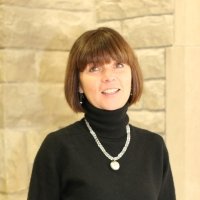
Associate Professor, Western University; Fellow, University of Toronto; Adjunct Professor, National University of the Kyiv Mohyla Academy

Kennan Institute
The Kennan Institute is the premier US center for advanced research on Eurasia and the oldest and largest regional program at the Woodrow Wilson International Center for Scholars. The Kennan Institute is committed to improving American understanding of Russia, Ukraine, Central Asia, the South Caucasus, and the surrounding region though research and exchange. Read more

Explore More
Browse Insights & Analysis
Building a Thriving Ukrainian Design Community Now
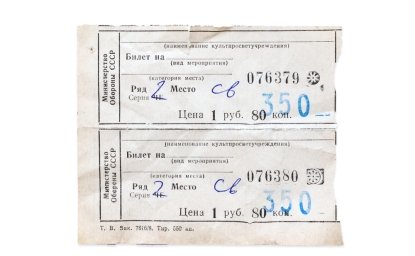
Чудеса в глазах смотрящего
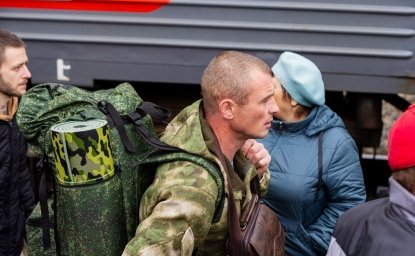
Уехал на СВО
